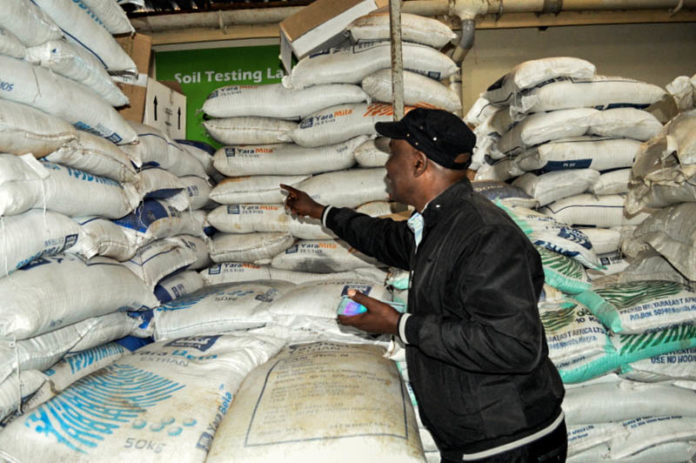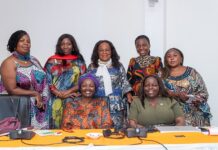By Winnie Kamau and Elisabetta Demartis
The lush green is the scenery you encounter as you take the 5-hour drive from Nairobi to Meru County, one of the food baskets of Kenya. While every seed should give the farmers of this region good yields and produce a good harvest, low crop yields, which may be linked to erratic weather patterns, poor soils, and the myriad effects of climate change reduce drastically the productivity.
56-year old Gilbert Kibiti is a farmer based in Meru County. As a young man, Kibiti inherited two acres of a tea farm in Kathera, a town in Meru County. But he dreamed of more — of diverse crops, high yields, and successful farming. Over the course of two decades of farming, Kibiti developed his two acres of tea farm to over 40 acres of diverse, arable land and founded Farmer’s Center, an organization that provides farmers with authentic products and extension services.
For a long time, Kibiti was a victim of overfeeding his soils with unwanted nutrients. “I have 10-acre maize farm and I would get 15-18 bags per acre.” Kibiti decided to test his soil for its’ nutrient levels, to try and get to the bottom of his low yields. “Unknown to me, the pH was too high,” Kibiti says. “I was told to level it by using lime and organic matter and now am able to get 25 bags per acre.” With the help of soil-testing technology, Kibiti was able to increase his yield by almost 70%.

Soil-testing technology helps farmers improve their yields by checking the fertility of the soil and providing farmers with information about what specific nutrients are in their soil and what nutrients are lacking. Seeds, like people, need different levels of nutrients to be healthy and grow strong, and the majority of these nutrients come from the soil. But many farmers do not know the nutrients their crops need to grow best, nor do they know the nutrients their soil contains. Many farmers add various fertilizers to their soil in an effort to produce better crop yields, but without knowing which nutrients are necessary, these fertilizers can be unhelpful and ineffective.
Kibiti decided to test his 20-acre tea farm. He soon discovered that his farm needed more sulphur nutrients, by increasing from 4 kilos of leaves per tea stump to 4.5 kilos per stump. Add this to the increases in his corn crop yield, and it becomes very clear that his business is growing and becoming more profitable. Following his success with soil-testing his farm, Kibiti decided to install the new technology at his Farmer’s Centre, which serves over 200,000 farmers in the region. “There’s a need for such equipment to analyse the farmers’ soil to determine the soil fertility, because yields are diminishing,” Kibiti says. “And every time a farmer comes to the [Farmer’s Centre], they want to buy fertiliser but they are not aware of which fertiliser to buy.” Now, farmers can test their soil to figure out specific nutrients their crops may need, and purchase specific fertilizers tailored to their needs.

Soil Cares, a cheap way to access information to fight land degradation
For decades, the Wet Chemistry test was the primary technology for soil testing in Kenya. A farmer would take a sample of his soils to the lab in Nairobi, Kenya’s capital city, and technicians would pour chemicals on the soil. Dry Chemistry testing has revolutionized the soil-testing industry, and many farmers’ lives. Today, farmers can have their soil tested right on their farmland, with the help of the Soil Cares Initiative, that uses Stereoscopy technology to shine a light to a soil sample and use the data that comes back to infer the characteristics of the soil.
Soil Cares is one of the premier dry chemistry testing companies in Kenya. The Soils Cares Initiatives was started by Reinder van der Meer, a Dutch man who settled in Kenya in 2009. He initially opened a Wet Chemistry Lab, but soon realised it was cumbersome, and began offering the Dry Chemistry test instead. He has not looked back ever since.

Dennis Mbaabu, the Lab Technician in charge of the Farmers Centre Soil Care Testing in Meru, explains how the technology works: “We get soil samples from the farmers, from topsoil and deep soil (about 25cm deep) to get the nutrient levels.” Once the soil is brought to the lab, it is labeled, given a barcode, and fed into the Soil Cares database, which is stored in the Soil Cares headquarters in the The Hague, Netherlands. The results are either sent to the farmer’s phone or printed on the spot. The results include information on what nutrients have been found in the soil, what crops can survive best with the nutrients available, and what nutrients and fertilizers are necessary for certain crops. This whole process takes two hours and costs 13 USD per test.

Land degradation and regaining of its neutrality has been a big concern for many small scale farmers. The United Nations Convention to Combat Desertification (UNCCD), a convention mandated to deal with land degradation, has raised the red flag, pointing to how rapidly land resources are degrading, affecting the livelihoods of over 2.5 billion small-scale farmers worldwide. A recent r
A recent report by UNCCD indicates 25 billion tonnes of fertile soil is lost every year, while we also lose an average of 1.7 million trees per hour, totalling to 15 billion trees lost every year. Soil Cares is also rolling out hand scanners which send text messages to the farmers through an application. They have also been able to expand, and have built labs in Tanzania, Ivory Coast, Rwanda, Namibia, Europe, Russia, and Ukraine. They see soil-testing stereoscopy as a global technology. Stereoscopy technology can be used widely, and Soil Cares is now expanding to test animal feed as well as soil. They have also developed a mobile application, and are in the process of developing a second application that acts as a crop-monitoring system with the use of real-time information. The hand scanner is mobile and gives a summarised analysis of the soil tested to the farmer while the Big Dry Lab does a complete analysis of the soil.

Soil Cares is also rolling out hand scanners which send text messages to the farmers through an application. They have also been able to expand, and have built labs in Tanzania, Ivory Coast, Rwanda, Namibia, Europe, Russia, and Ukraine. They see soil-testing stereoscopy as a global technology. Stereoscopy technology can be used widely, and Soil Cares is now expanding to test animal feed as well as soil. They have also developed a mobile application, and are in the process of developing a second application that acts as a crop-monitoring system with the use of real-time information. The hand scanner is mobile and gives a summarized analysis of the soil tested to the farmer while the Big Dry Lab does a complete analysis of the soil.
Kibiti has been able to spread Farmers Center branches beyond Meru County to Laikipia, Isiolo, Marsabit and Nyeri Counties in Kenya. His wish is this: “I would urge every institution and person who matters to get to the farmer. Get the farmers in the villages well-informed of the new technologies, especially in soil testing.”














